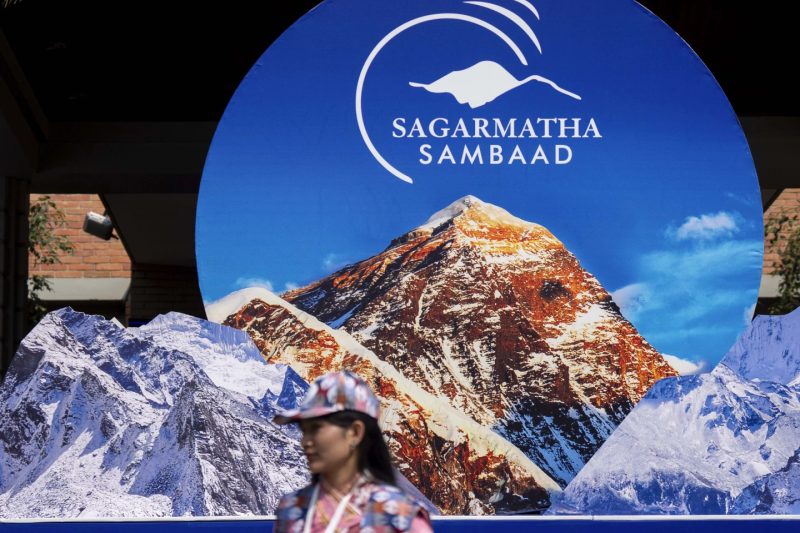- Israel Strikes Tehran with US Support Amid Nuclear Tensions |
- India Sees 9% Drop in Foreign Tourists as Bangladesh Visits Plunge |
- Dhaka Urges Restraint in Pakistan-Afghan War |
- Guterres Urges Action on Safe Migration Pact |
- OpenAI Raises $110B in Amazon-Led Funding |
Nepal hosts climate meet as Himalayan glaciers recede

A volunteer awaits to welcome delegates during the inauguration of an environment conference named Sagarmatha Sambaad (Mount Everest Dialogue) at the Soaltee Hotel in Kathmandu, Nepal, Friday, May 16, 2025.
An environment conference opened in Nepal on Friday to address global climate change, focusing on the alarming melting of glaciers in the Himalayan mountains.
The three-day event in Kathmandu, titled “Climate Change, Mountains and the Future of Humanity,” will feature discussions on critical climate challenges facing the region and the world.
“From the lap of Sagarmatha (Mount Everest), the world’s highest peak, we send a clear message: protecting the mountains means protecting the planet, the seas, and humanity itself,” Nepal Prime Minister Khadga Prasad Oli said at the opening session.
Nepal is home to eight of the world’s tallest peaks, including Mount Everest. The rapid melting of glaciers in the Himalayas due to global warming has raised serious concerns. As snow and ice recede, the exposed terrain increases the risk of rockslides, landslides, and avalanches.
Scientists warn that the Himalayas could lose up to 80% of their glaciers over the coming decades or centuries if global temperatures continue to rise. This could also lead to more frequent flash floods and avalanches.
“The Himalayas are undergoing an unprecedented stress test, revealing both the fragile state of mountain ecosystems and the failure of meaningful global climate action,” Nepal’s Foreign Minister Arzu Rana Deuba said. “As a mountainous country highly vulnerable to disasters, Nepal faces a grave challenge.”
Deuba highlighted recent severe weather events in Nepal that have caused widespread damage and suffering. “Floods and glacial lake outbursts have led to large-scale destruction, while droughts, water shortages, and forest fires continue to affect communities across the country.”
Ministers from neighboring countries including India, Bhutan, and the Maldives are participating in the conference.
Organizers plan to issue a Kathmandu declaration summarizing the discussions and proposed actions once the conference concludes on Sunday.

